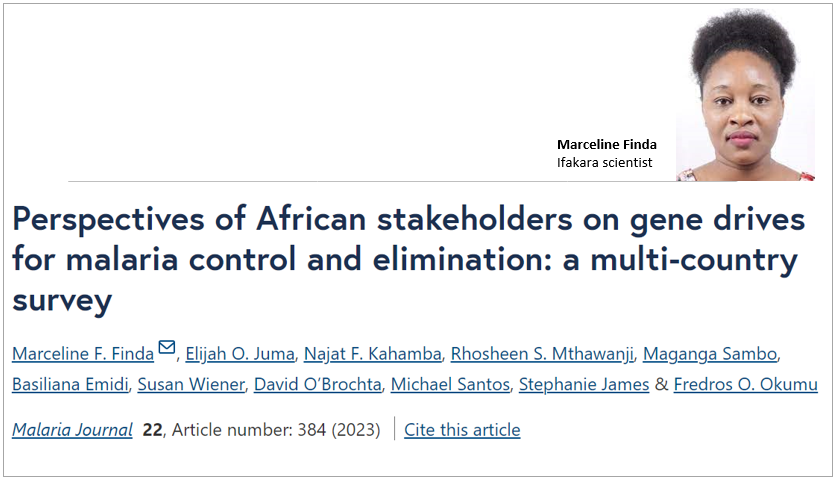
ENGAGEMENT: Promising support for gene drives to end malaria in Africa

After reaching out to dozens of public health stakeholders from 25 countries across Africa, scientists have yet again underlined the potential of gene drives in the continent, suggesting that the technologies can be a useful tool to support ongoing efforts to eliminate malaria in Africa.
Scientists from Malawi, Kenya, the United States, the United Kingdom and Tanzania, led by Dr. Marceline Finda from Ifakara Health Institute, report in their new paper published on the Malaria Journal recently that most people they engaged with in their latest study were in support of the technologies.
“A majority of the respondents (92.9%) stated that they would support field trials or implementation of GDMMs [gene drive modified mosquitoes] in their respective countries,” report the scientists when presenting findings of their study which sought explored the insights and recommendations of key stakeholders across Africa on the potential of gene drive modified mosquitoes for malaria control and elimination in the continent.
Continuous engagement is crucial
Gene drive modified mosquitoes have the potential to address Africa's persistent malaria problem but are still in the early stages of development and testing. Dr. Marceline Finda and colleagues believe continuous engagement of African stakeholders is crucial for the successful evaluation and implementation of these technologies.
This study also identified significant misconceptions regarding the phase of GDMM testing in Africa, as several participants incorrectly asserted that GDMMs were already present in Africa, either within laboratories or released into the field.
According to the scientists, their findings and recommendations were made after reaching out to 198 stakeholders from 25 countries in sub-Saharan Africa. They were drawn from academia, research and regulatory institutions, government ministries of health and environment, media and advocacy groups.
High awareness, low understanding of attributes
Despite high levels of awareness of GDMMs among the stakeholders (76.7%), the scientists report there was a relatively low-level of understanding of their key attributes and potential for malaria control (28.3%).
“When more information about GDMMs was provided to the stakeholders, they readily discussed their insights and concerns and offered several recommendations to ensure successful research and implementation of the technology.
The stakeholders’ recommendations include: increasing relevant technical expertise within Africa, generating local evidence on safety, applicability, and effectiveness of GDMMs, and developing country-specific regulations for safe and effective governance of GDMMs.
Why stakeholders’ views matter
The scientists underline in their research paper that incorporating the views and recommendations of African stakeholders in the ongoing research and development of gene drive modified mosquitoes is crucial for instilling stakeholder confidence in their potential application.
“These findings will enable improved planning for GDMMs in Africa as well as improved target product profiles for the technologies to maximize their potential for solving Africa's enduring malaria challenge,” they further comment.
Ifakara, 7 partners contribute to the study
Apart from the Ifakara Health Institute, scientists who joined forces to implement the study came from seven other reputable research outfits. They include: the Pan-African Mosquito Control Association (PAMCA), Kenya; the Malawi Liverpool Wellcome Trust Clinical Research Programme, Malawi; and the National Institute for Medical Research, Tanzania.
Others are: the Foundation for the National Institutes of Health, United States; the School of Life Science and Bioengineering at the Nelson Mandela African Institution of Science and Technology, Tanzania; the School of Biodiversity, One Health and Veterinary Medicine at the University of Glasgow, United Kingdom and the School of Public Health, Faculty of Health Sciences at the University of the Witwatersrand, South Africa.
More: About gene drive modified mosquitoes
Among the new generation of technological tools being developed to combat malaria, gene drives are among them. This is a method for genetically modifying malaria-spreading mosquitoes and ultimately reducing or replacing their populations.
What are gene drives, then? They’re a ‘selfish genetic element’, in the form of lengths of DNA code, that increase the chance of a selected trait being inherited. In normal circumstances, mosquitoes (like humans) get two copies of each gene, one from each parent. There is then an equal chance of passing either on. But when gene drive systems are present in the genome, that chance increases to up to 99%.
Gene drives do this by cutting the chromosome at the point where the desired version of the gene is absent and then inducing the cell to repair the cut with a template provided by the gene drive. The cell now has two identical copies of the same gene, ensuring the inheritance of the gene and its corresponding trait. The gene drive itself will also be inherited as part of this process.
Learn more about gene drive here.
Read the publication in full, here.
